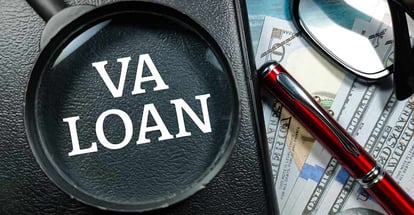How to Buy a House with a VA Loan in Florida in 2025
If you're intrigued and eager to explore these distinctive loan opportunities available to Florida residents, continue reading our comprehensive guide on VA home loans.
Discover whether these loans may be the ideal choice for you, providing valuable insights and information to assist in your decision-making process.
What Is A VA Loan?
In Florida, VA loans specifically cater to veterans, active service members, and eligible spouses, receiving support from the U.S. Department of Veterans Affairs (VA). Although the VA establishes the terms for these mortgages, they are actually issued by private lenders.
When comparing VA loans to conventional loans, VA loans generally offer easier qualification criteria and often eliminate the need for a down payment, unless the lender deems it necessary.
Dating back to 1944, VA loans were introduced as part of the Servicemen's Readjustment Act, commonly referred to as the GI Bill of Rights.
These loans were specifically designed to enhance accessibility to mortgage financing for Florida's service members who might encounter challenges in securing housing loans otherwise.
How Does A VA Loan Work?
VA loans in Florida share similarities with conventional loans but possess several key distinctions.
While conventional loans lack government backing, VA loans are supported by the VA. Consequently, if the borrower defaults, the VA assumes responsibility for a portion of the loan.
Each borrower is assigned an "entitlement," representing the maximum amount the VA will reimburse the lender in the event of default. With full entitlement, this reimbursement can reach up to 25% of the approved loan amount.
This guarantee empowers private lenders to be more flexible with their borrower requirements. As a result, the VA home loan program has gained recognition for offering competitive interest rates and the option of a nonessential down payment.
Furthermore, the VA home loan program imposes less stringent criteria on borrowers compared to conventional loans.
While the VA itself does not mandate a minimum credit score, lenders have the discretion to establish their own requirements.
It is possible to secure a VA loan with a credit score as low as 500, although most lenders prefer scores ranging from 580 to 650.
For instance, MakeFloridaYourHome® mandates a minimum credit score of 580 for VA loans. On the other hand, conventional loans typically require a minimum credit score of 620 or higher, making them more challenging to qualify for.
The process of obtaining a VA loan in Florida closely mirrors that of conventional loans for both houses and condos. The conventional path of preapproval and making an offer remains unchanged.
However, in addition to other inspections, a VA appraisal becomes necessary for VA loans. A VA appraisal is conducted by a certified individual appointed by the U.S. Department of Veterans Affairs.
This appraisal ensures that the property meets the minimum requirements set by the VA, safeguarding buyers from overpaying for a home.
To be eligible for a VA loan in Florida, obtaining a Certificate of Eligibility (COE) is essential. This official document verifies that you meet the requirements for a VA loan and confirms your previous or current military service.
What Are The Terms Of A VA Loan?
When considering a VA loan in Florida, it's important to be familiar with the standard terms associated with this government-backed mortgage option.
Here are some key points to anticipate:
-
Assistance in Avoiding Default - As a VA loan beneficiary, you have the advantage of seeking support from the VA if you encounter difficulties in repaying your loan, helping you navigate potential default scenarios.
-
No Down Payment Requirement - In most cases, VA loans in Florida do not necessitate a down payment, unless the purchase price exceeds the appraised value of the home. This feature eliminates the need for a substantial upfront payment.
-
Exemption from Private Mortgage Insurance (PMI) - Unlike many other loan types, VA loans do not mandate private mortgage insurance. This exemption can result in significant cost savings for borrowers.
-
Limited Closing Costs - VA loans impose restrictions on closing costs, with certain fees, such as prepayment penalties, settlement charges, and attorney fees from the lender, being excluded. This limitation helps borrowers reduce their upfront expenses.
- Competitive Interest Rates - VA loans often offer highly competitive interest rates, making them an attractive choice compared to other loan options. These favorable rates can contribute to long-term savings for borrowers.
By being aware of these standard terms, prospective borrowers in Florida can make informed decisions when considering a VA loan, taking advantage of its unique benefits and affordability.
VA Loan Requirements And Eligibility
To qualify for a VA loan in Florida, you must meet specific eligibility criteria related to your military service, along with meeting certain loan qualifications.
Eligibility
Here are the guidelines for eligibility:
-
Service Member or Veteran Status - You must be a service member on active duty or an honorably discharged veteran to be eligible for a VA loan.
-
Minimum Service Requirements - You should have completed 90 consecutive days of active service during wartime or 181 consecutive days during peacetime to meet the basic service requirements.
Alternatively, if you have served over 6 years in the National Guard or Selected Reserve, you may also qualify. In some cases, if you have served at least 90 days under Title 32, with at least 30 of those days served consecutively, you may be eligible.
-
Surviving Spouse Eligibility - Surviving spouses of service members who are receiving dependency and indemnity compensation (DIC) can also qualify for a VA loan.
- Service-Connected Disability - If you were discharged due to a service-connected disability, the service time requirements mentioned above do not apply to you.
To obtain a Certificate of Eligibility (COE) required for the VA loan, you can apply on the VA's website or contact your lender directly. Some VA-approved lenders may offer expedited application processing.
The documents necessary to obtain a COE may vary based on your role:
-
Veteran - You will need a copy of your DD214 discharge or separation documents.
-
Active Service Member - You will need a statement of service signed by your commander or personnel officer, containing relevant information such as your name, social security number, date of birth, starting date of service, any lost time, and the name of the command providing the information.
- Surviving Spouse - You will need your deceased spouse's DD214 papers. Depending on whether you're receiving Dependency & Indemnity Compensation (DIC) benefits, additional documentation may be required.
For more details on the COE application process and requirements based on different roles, you can refer to the VA Benefits website.
Loan Requirements
When obtaining a VA loan in Florida, certain requirements are set by the VA, while others are determined by your lender.
While VA loans generally offer more flexibility compared to conventional loans, qualification is still necessary.
Here's what you can expect:
-
Debt-to-Income Ratio (DTI) - The VA recommends a DTI ratio below 41%. However, in specific circumstances, you may still be able to secure a VA loan with appropriate compensating factors, even if your DTI exceeds this threshold.
-
Employment History - Lenders typically prefer borrowers who have held a steady job for a minimum of 2 years. However, exceptions may be made for recently discharged veterans who may not have met the 2-year requirement.
-
Credit Score - The VA loan credit score requirement can be as low as 500, although most lenders prefer credit scores ranging from 580 to 650. For example, MakeFloridaYourHome® mandates a minimum credit score of 580 for VA loans.
In contrast, conventional loans often require a minimum credit score of 620 or higher, making them more challenging to qualify for, especially with bad credit.
-
Occupancy - VA loans must be utilized for financing a primary residence. However, there may be some exceptions or ways to use a VA loan for a second home or investment property, but these options come with specific conditions and depend on certain situations. It's advisable to consult with your lender to explore your possibilities if you're considering such scenarios.
- Appraisal - VA loans necessitate an appraisal conducted by an appraiser certified through the VA. The appraisal must meet the standards set by the VA to ensure the property's value aligns with the loan amount.
By understanding these requirements, Florida borrowers can adequately prepare and ensure they meet the necessary criteria when pursuing a VA loan.
Working closely with your lender will help clarify any specific details and address any questions or concerns you may have throughout the process.

Types Of VA Loans in Florida
Eligible borrowers in Florida have access to various types of VA loans designed to cater to different needs. Let's explore these options:
-
VA Rehab Loan - Similar to a traditional VA mortgage, this loan covers not only the cost of the house but also any necessary repairs or improvements. It provides financing for both the purchase and renovation of a property.
-
Interest Rate Reduction Finance Loan (IRRRL) - Also known as an Interest Rate Reduction Refinance Loan, this option aims to streamline the refinancing process. It allows borrowers to refinance their existing VA mortgage to obtain a lower interest rate or switch from an adjustable-rate VA mortgage to a fixed-rate one.
-
VA Cash-Out Refinance - With a VA cash-out refinance, borrowers can replace their current mortgage with a new one that permits them to withdraw the difference between their home equity and the property's value.
The funds obtained through this refinance can typically be used for home renovations or other purposes. It can be done with an existing VA loan or by replacing a conventional loan with a VA loan, subject to qualification.
- NADL Loan - A Native American Direct Loan (NADL) is a specialized VA loan that assists Native American veterans in purchasing, building, or refinancing properties located on federal trust land.
These different types of VA loans provide flexibility and options for eligible borrowers in Florida, allowing them to choose the loan program that aligns with their specific circumstances and requirements.
It's essential to consult with a VA-approved lender to determine the most suitable loan type for your needs.
VA Loan Funding Fee And VA Closing Costs
While VA loans offer numerous benefits, it's essential to be aware of the unique fees associated with them. Here are some important fees to consider:
Funding Fee
Most borrowers are required to pay a one-time VA funding fee, which helps lower costs for taxpayers since VA loans don't typically require down payments or mortgage insurance.
The funding fee amount varies based on the loan type, down payment amount, and your military role. It can range from 0.5% to 3.3% of the loan amount. The fee can be paid upfront or rolled into the total loan amount.
Certain individuals, such as those with a service-connected disability, certain surviving spouses of veterans, and Purple Heart recipients, may be exempt from paying the funding fee.
Additional Closing Costs
In addition to the funding fee, there are other closing costs associated with VA loans. These can include:
-
Loan Origination Fee - A fee charged by the lender for processing the loan application.
-
VA Appraisal Fee - The cost of the VA-required appraisal to determine the property's value.
-
Credit Report and Payment of Credit Balances or Judgments - The fee for obtaining your credit report and settling any outstanding credit balances or judgments.
-
Hazard Insurance and Real Estate Taxes - The payment for hazard insurance to protect the property and real estate taxes.
-
State and Local Taxes - Applicable taxes imposed by the state and local government.
-
Title Insurance - Insurance to protect against any potential issues with the property's title.
- Recording Fee - The fee for recording the mortgage and related documents with the county.
These closing costs may vary depending on factors such as the location of the property and the lender you choose.
It's important to review and understand the specific fees associated with your VA loan, and your lender can provide you with a detailed breakdown of the closing costs involved.
VA Loan Limits in Florida
For eligible borrowers with full entitlement, there are no limits on the loan amount they can borrow with a 0% down payment. This provides significant flexibility for borrowers who meet the requirements.
However, borrowers with reduced entitlement, also known as impacted entitlement, do have loan limits. The VA loan limit for impacted entitlement is determined by the county limit, which is based on conforming loan limits.
Here are the loan limits for some of the largest counties in Florida as of 2022:
-
Miami-Dade County - The loan limit for Miami-Dade County is $726,200. This conforming loan limit applies to most areas in the county.
-
Broward County - Broward County shares the same loan limit as Miami-Dade County, which is $726,200 for conforming loans.
-
Palm Beach County - Similar to Miami-Dade and Broward, Palm Beach County has a conforming loan limit of $726,200.
-
Hillsborough County - For Hillsborough County, the loan limit is also set at $726,200 for conforming loans.
-
Orange County - In Orange County, the conforming loan limit stands at $726,200.
- Duval County - Duval County follows the general conforming loan limit of $726,200.
It's important to note that these loan limits are subject to change and may vary based on updates from the Federal Housing Finance Agency (FHFA).
For specific loan limits in other Florida counties or any recent changes, borrowers are advised to consult with their VA-approved lender or check the FHFA website for the most up-to-date information.
Understanding the loan limits in each county is crucial for borrowers planning to utilize a VA loan in Florida, as it helps determine the maximum loan amount available without requiring a down payment.
The Pros And Cons Of A VA Home Loan
Let's summarize the benefits and considerations of VA loans:
Pros
-
No Down Payment - VA loans do not require a down payment, making homeownership more accessible for eligible borrowers.
-
No PMI - Unlike conventional loans, VA loans do not necessitate private mortgage insurance (PMI), resulting in cost savings over the life of the loan.
-
Lower Interest Rates - VA loans often offer competitive interest rates, typically lower than those of conventional loans.
-
Closing Cost Exemptions - VA loans may provide exemptions or limitations on certain closing costs, reducing the upfront expenses for borrowers.
-
Flexible Credit Score and DTI Requirements - VA loans generally have less stringent credit score and debt-to-income (DTI) requirements compared to conventional loans, providing more flexibility for borrowers.
-
Multiple Use of VA Loan Benefit - Eligible borrowers may be able to utilize their VA loan benefit multiple times, as long as each use is for a primary residence.
- Post-Foreclosure and Bankruptcy Eligibility - It's possible to qualify for a VA loan even if you have recently gone through the foreclosure process or bankruptcy. The waiting period is typically two years.
Cons
-
Eligibility Requirements - VA loans are exclusively available to service members who meet specific requirements. It's crucial to ensure you meet the necessary terms as a potential borrower.
-
VA Funding Fee - While there is no requirement for private mortgage insurance, VA loans incur a one-time VA funding fee mandated by the federal government. The fee contributes to reducing costs for taxpayers and can be financed or paid upfront.
-
Primary Residence Requirement - VA loans can only be used to finance primary residences. They cannot be used for vacation homes or investment properties.
- Misconceptions and Seller Wariness - There are misconceptions surrounding VA loans, such as the belief that they take longer to close or may encounter difficulties during the closing process. Although these are misconceptions, they can make sellers cautious about working with VA loan borrowers.
By understanding the benefits and considerations associated with VA loans, potential borrowers in Florida can make informed decisions and leverage the advantages offered by this home loan program.
It's essential to consult with a VA-approved lender like MakeFloridaYourHome to navigate the process and explore the specific details relevant to your circumstances.
With over 50 years of mortgage industry experience, we are here to help you achieve the American dream of owning a home. We strive to provide the best education before, during, and after you buy a home. Our advice is based on experience with Phil Ganz and Team closing over One billion dollars and helping countless families.

About Author - Phil Ganz
Phil Ganz has over 20+ years of experience in the residential financing space. With over a billion dollars of funded loans, Phil helps homebuyers configure the perfect mortgage plan. Whether it's your first home, a complex multiple-property purchase, or anything in between, Phil has the experience to help you achieve your goals.


 By
By  Edited by
Edited by 






